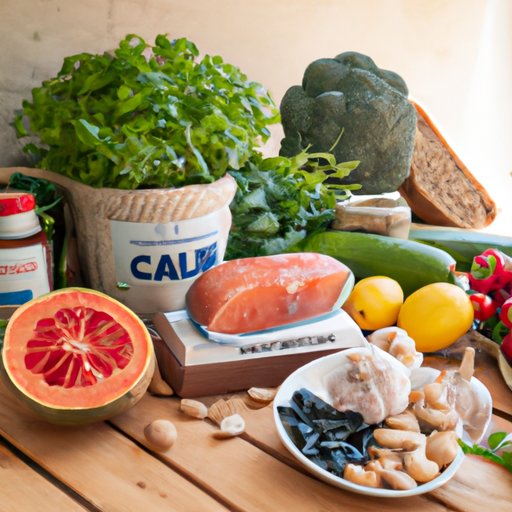Introduction
Cancer is a leading cause of death around the world, with an estimated 9.6 million deaths caused by the disease in 2018 alone. While there is no single solution to preventing cancer, there is increasing evidence that diet can play an important role in reducing the risk of developing certain types of cancer.
Dietary interventions for cancer prevention typically involve either reducing or eliminating certain foods from the diet, or increasing consumption of certain foods. The most common dietary approaches include the Mediterranean Diet, Low-Carbohydrate, High-Fat Diet, and Plant-Based Diet. Each of these diets has its own unique set of advantages and disadvantages, and it is important to understand the evidence behind each approach before making any dietary changes.
Comparing Different Dietary Approaches to Preventing Cancer
The Mediterranean Diet is based on the traditional eating habits of countries bordering the Mediterranean Sea. It emphasizes consuming whole grains, fruits, vegetables, legumes, nuts, olive oil, and fish while limiting red meat, processed meats, and saturated fats. Studies have found that the Mediterranean Diet may reduce the risk of certain cancers, such as colorectal cancer.
The Low-Carbohydrate, High-Fat (LCHF) Diet involves reducing carbohydrates, such as bread and pasta, and replacing them with healthier sources of fat, such as olive oil and avocados. This type of diet has been shown to lead to weight loss, as well as improved cholesterol levels and blood sugar control. Studies have also linked the LCHF Diet to a reduced risk of certain cancers, including breast cancer.
The Plant-Based Diet focuses on consuming only plant-sourced foods, such as fruits, vegetables, nuts, seeds, and legumes. This type of diet has been associated with a number of health benefits, such as improved heart health and weight loss. Studies have also suggested that a Plant-Based Diet may reduce the risk of certain types of cancer, including prostate cancer.

Examining the Evidence Behind Dietary Interventions for Cancer Prevention
There are two main types of studies used to examine the effects of diet on cancer prevention: clinical trials and observational studies. Clinical trials are controlled experiments that involve randomly assigning participants to one of two groups: an intervention group that follows a particular diet, and a control group that does not. These studies provide the strongest evidence for the effectiveness of a particular dietary intervention.
Observational studies, on the other hand, involve following a large group of people over a period of time to see how their dietary habits affect their health outcomes. Although observational studies cannot prove causality, they can provide valuable insights into the relationship between diet and cancer prevention.

Exploring the Role of Nutrition in Cancer Prevention
Nutrition plays an important role in cancer prevention. Macronutrients, such as carbohydrates, proteins, and fats, all provide essential energy and nutrients that the body needs to function properly. Eating a balanced diet that includes a variety of macronutrients can help reduce the risk of developing certain types of cancer.
Micronutrients, such as vitamins and minerals, are also important for cancer prevention. Getting enough of these essential nutrients through a healthy diet or supplements can help reduce the risk of cancer development.
Investigating the Link Between Diet and Cancer Risk
Although diet is an important factor in cancer prevention, it is not the only factor. Genetics, environmental factors, and lifestyle choices all play a role in determining a person’s risk of developing cancer. For example, some people may be genetically predisposed to certain types of cancer, while others may be exposed to environmental toxins that increase their risk.
Examining the Role of Specific Foods in Cancer Prevention
Certain foods have been found to have a protective effect against cancer. Cruciferous vegetables, such as broccoli, cauliflower, and Brussels sprouts, contain compounds that can help reduce the risk of certain cancers. Fruits and vegetables are also rich in antioxidants, which can help protect against oxidative damage that can lead to cancer development.
Dairy products, such as milk, cheese, and yogurt, are also thought to have cancer-protective properties. Studies have shown that consuming dairy products may reduce the risk of certain types of cancer, such as colorectal cancer.

Analyzing the Impact of Lifestyle Factors on Cancer Prevention
In addition to diet, lifestyle factors can also influence cancer risk. Regular physical activity has been linked to a reduced risk of certain types of cancer, such as breast and colon cancer. Smoking is a major risk factor for many types of cancer, so quitting smoking can help reduce the risk of developing cancer.
Alcohol consumption has also been linked to an increased risk of certain types of cancer, such as breast and colorectal cancer. Limiting alcohol consumption can help reduce the risk of developing these diseases.
Conclusion
Diet plays an important role in cancer prevention, but it is not the only factor. Eating a balanced diet that includes a variety of nutrient-dense foods, such as fruits and vegetables, can help reduce the risk of developing certain types of cancer. In addition, engaging in regular physical activity, avoiding smoking, and limiting alcohol consumption can all help reduce the risk of cancer development.
(Note: Is this article not meeting your expectations? Do you have knowledge or insights to share? Unlock new opportunities and expand your reach by joining our authors team. Click Registration to join us and share your expertise with our readers.)
